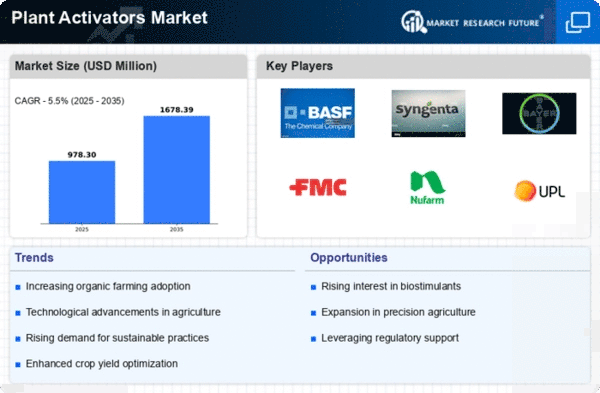Market Share
Plant Activators Market Share Analysis
Plant Activators Market changes are changing the agriculture business. Demand for plant activators is rising due to sustainable and organic farming. These bio-based remedies boost plant defenses against diseases and pests without chemical pesticides. This tendency follows the green agricultural movement.
Precision farming and IPM are affecting the Plant Activators Market. Farmers utilize plant activators to boost yields and reduce synthetic inputs. IPM relies on plant activators to balance ecosystems, reduce chemical use, and promote sustainable agriculture.
Plant activators are in demand as producers explore ways to reduce the effects of climate change on crop health. Plant activators boost natural defenses to help plants survive high temperatures, drought, and rainfall. Farmers are vigilant in protecting agricultural output from uncertain climate circumstances.
Growing awareness of food safety and residue-free produce is encouraging plant activator usage in agriculture. Farmers are switching to plant activators to reduce chemical residues in food due to consumer concerns. These compounds improve plant immunity without leaving residues, meeting customer demand for clean, sustainable agriculture.
Technological advances in formulation and application affect the Plant Activators Market. Research and development are helping manufacturers make plant activators that work better and are easier to apply. Nanotechnology, microencapsulation, and delivery technologies improve these goods, allowing farmers to maximize benefits with lower application rates.
International commerce and globalization shape the Plant Activators Market. As agriculture grows more global, plant activators are needed worldwide. Countries with various climates and crop portfolios seek plant activator solutions to meet unique issues, driving market growth globally.
A major trend in the Plant Activators Market is sustainable and regenerative agriculture. Plant activators support regenerative agriculture by improving soil health and ecosystem resilience. Regenerative farmers consider plant activators essential to holistic, environmentally friendly farming.
Manufacturers, research institutes, and agricultural groups are collaborating to innovate and develop the Plant Activators market. New plant activator formulas, application methods, and sustainable agriculture solutions result from collaborative research. These collaborations advance the market.
Consumer awareness initiatives on sustainable agriculture are affecting the Plant Activators Market. As customers learn about conventional farming's environmental and health implications, demand for eco-friendly and natural products rises. Plant activators appeal to customers seeking sustainable crops, increasing their use in agriculture.
Finally, sustainable agriculture, climate resiliency, technology improvements, and customer preferences are transforming the Plant Activators Market. The sector is adapting to modern agriculture by offering eco-friendly crop health and productivity solutions. As these developments affect the market, the Plant Activators sector will grow and innovate.



















Leave a Comment